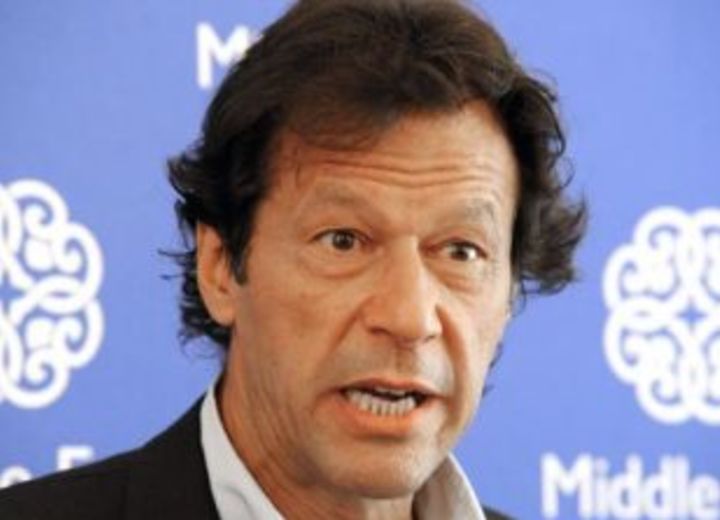An evening with Imran
At 57, Imran Khan still stands tall and lean

At 57, Imran Khan still stands tall and lean. The Pathan lineage is reflected in those broad shoulders. There isn’t any fat noticeable.
This was the first time I had seen Imran in person. He still looked the same man who charged in with a purpose, with that lovely slinging action, and always managed to retain a confident demeanour regardless of the match situation. He motivated his troops with words that could spur them on to do things they thought they could never do. He came back from retirement to nearly win a Test series against the mighty West Indies in 1987.
Five year later, at 40, he retained the hunger to lead Pakistan to a World Cup triumph. Later he would build a cancer hospital in memory of his mother; he is now raising funds to start a university in Miawali. What a life.
A Pathan who came to England, was educated at Oxford, was in awe of his two cricketing cousins, and always wanted to be a batsman. Instead, he made up his mind to turn to fast bowling, having seen Dennis Lillee at full throttle. He has also been a man who could woo the most glamorous, beautiful and rich women in the world with his persona, and is now a man fighting to be an independent politician in a country ruled for generations by feudal lords and the army. It takes balls.
Little wonder, then, that he is Shahid Afridi’s hero, as he was to Wasim Akram, Waqar Younis and every other Pakistani. It is a unique thing – cricketers' heroes usually differ from generation to generation, but in Pakistan it was always Imran. It still remains.
So it was a given that I would not miss Imran delivering the MCC’s annual Colin Cowdrey Spirit of Cricket Lecture.
The address began with an introduction by John Barclay, MCC president, popular for his eccentric behaviour, and who was once Imran’s captain at Sussex.
Imran started off by reminiscing about what made him suggest, back in the 1980s, that neutral umpires be introduced. It was a period when the umpires had become unashamedly biased and partial, so much so that series results were being altered. He even pointed out an interesting example when Pakistan were playing India in Bangalore and had the hosts on their knees at 90 for 4 by lunch with only the inimitable Sunil Gavaskar battling hard.
According to Imran, on a spinning track his slow bowlers were rushing to the umpire, appealing at least three times an over. But the Indian umpires stood stoic and non-committal. With every passing minute the tension mounted, so much so that at one point Imran had to focus on restraining the frequent charges by his fielders, led by the “suicide bomber”, Javed Miandad.
Sadly, as the evening wore on, Imran failed to maintain the tempo. He lost himself making the same point. It was an occasion meant to discuss the current state of cricket and introduce some new ideas. It was about reigniting fresh thoughts and talking about something original. The only two things Imran was in favour of were the use of technology and the preserving of express fast bowlers from the abundance of one-day and Twenty20 cricket. It was a disappointing lecture.
I was expecting him to take on the game’s governing bodies and their dilly-dallying on the use of the UDRS, or to present a formula where countries could produce Test cricketers who would not be swayed by the extravagance of the shorter formats. Instead Imran suddenly seemed weary. You could sense him stretching his point.
He could’ve taken his cue from a contemporary, Jeff Thomson, the former Australian speed ace. Thommo was restless, twitching, crinkling his eyes, shaking his foot, as he took a seat next to Imran for a panel discussion. Like always, he slung his arrows straight and inadvertently they hit the bull's eye. “I don’t know what I am doing at this lecture,” he said, making the entire audience burst into laughter.
As a fast bowler, he said, you need to just attack the batsman. Never take a back step. He said he never believed in going to the gym, and instead lugged gallons of beer around during his university days to keep himself strong. That was enough for him.
When the emcee, Mark Nicholas, asked both Imran and Thommo about the prospects of current Australian Shaun Tait, they agreed Tait was the quickest around but was only meant for the short format. “If I were to bowl two-over spells I would be an alcoholic by now,” Thommo quipped.
The evening was sprinkled with famous anecdotes by both men, who had terrorised batsmen the world over and mesmerised fans. Steve Finn, England’s latest sensation, who was on the panel with the pair, said he had Angus Fraser say to him earlier: “You don’t think when you bowl fast.” Imran and Thommo followed that principle.
Nagraj Gollapudi is an assistant editor at ESPNcricinfo
Read in App
Elevate your reading experience on ESPNcricinfo App.